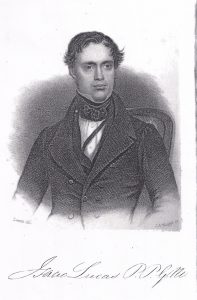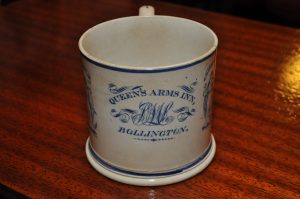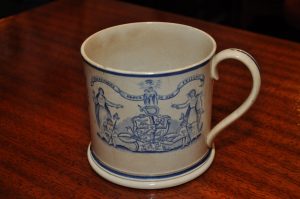 Isaac Lucas was born on 3rd January 1804, probably at Sugar Lane Farm, Adlington. He was the illegitimate son of Betty Lucas and grandson of Andrew Lucas and his wife Dorothy Sellers who were mainly responsible for his upbringing. He was baptised at St Peter’s Church, Prestbury on 26th February 1804. He received a better education than might have been expected for someone of his background, and at the age of eight was sent to a local school to learn accounts. He gained the attention of, and was supported financially to some degree, by Edward Downes of Shrigley Hall, who was a patron of Isaac’s school.
Isaac Lucas was born on 3rd January 1804, probably at Sugar Lane Farm, Adlington. He was the illegitimate son of Betty Lucas and grandson of Andrew Lucas and his wife Dorothy Sellers who were mainly responsible for his upbringing. He was baptised at St Peter’s Church, Prestbury on 26th February 1804. He received a better education than might have been expected for someone of his background, and at the age of eight was sent to a local school to learn accounts. He gained the attention of, and was supported financially to some degree, by Edward Downes of Shrigley Hall, who was a patron of Isaac’s school.
Isaac was an enthusiastic and influential member of the Independent Order of Odd Fellows![]() , and in the ‘Odd Fellows Magazine’ of October 1840, there is a picture of Isaac (left) together with a short biography. This states that in 1822, at the age of 18, Isaac travelled to London where he was introduced to and became interested in, the principles of ‘Odd Fellowship’. On his return, he worked with an uncle in Manchester to set up a new Odd Fellows’ lodge, and on Christmas day 1824, the ‘Honest Endeavour Lodge’ of the Independent Order of Odd Fellows was formed in Bollington with Isaac as its first secretary. In order to secure a proper meeting place for the Lodge, Isaac took over the Queen’s Arms public house on High Street and furnished the meeting room at his own expense.
, and in the ‘Odd Fellows Magazine’ of October 1840, there is a picture of Isaac (left) together with a short biography. This states that in 1822, at the age of 18, Isaac travelled to London where he was introduced to and became interested in, the principles of ‘Odd Fellowship’. On his return, he worked with an uncle in Manchester to set up a new Odd Fellows’ lodge, and on Christmas day 1824, the ‘Honest Endeavour Lodge’ of the Independent Order of Odd Fellows was formed in Bollington with Isaac as its first secretary. In order to secure a proper meeting place for the Lodge, Isaac took over the Queen’s Arms public house on High Street and furnished the meeting room at his own expense.
An early 19th century one quart presentation mug (right) has been returned to this country from America bearing both the insignia of the Independent Order of Odd Fellows and the name of the Queen’s Arms Inn, Bollington (click on the images for a bigger view). The census of 1841 confirms that Isaac was living on High Street and working as a publican. Isaac became a leading light in the Order of Odd Fellows much more widely, and in 1827 he was made Grand Master of the District, being honoured by the presentation of a valuable silver medal, and entailing visits to many parts of the country to participate in annual national conferences.
When the Macclesfield Poor Law Union was established in 1836, Isaac was appointed as one of two Guardians representing Bollington – a position he held until his death. There was a total of 50 Guardians serving the Macclesfield Union, and Isaac was held in sufficient esteem by his fellows that he was elected to serve as their Chairman for a period of years. Clearly very committed to public service, Isaac also served on the Bollington Local Board of Health (precursor to the Bollington Urban District Council) from its inception in 1866, and he continued to attend its meetings, in spite of declining health, until his death in 1880.
Following his time as publican at the Queens Arms, Isaac pursued a number of varied careers. He served for many years as a Sheriff’s Officer (Bailiff?), and at the time of the 1851 census he was away from Bollington and staying in Chester carrying out those duties. He also established a successful business as an auctioneer, and Local Directories of the time show that he conducted his business from premises in Park Street. In the 1850’s, Isaac took over the tenancy of Cold Arbour Farm in Tytherington where he farmed 35 acres while continuing his business as an auctioneer.
In 1825, Isaac married Matilda Mottershead at St Peter’s Church, Prestbury. Matilda was a daughter of Edmund and Catherine Mottershead and she was born in Bollington in 1802. The couple raised 8 children between 1828 and 1845. Isaac’s son, Edward John, continued his father’s business as auctioneer from Park Street. The youngest daughter, Hannah Dorothy, married Joseph Warburton, watchmaker and repairer, of Palmerston Street in 1875. Another daughter, Anne, took over Cold Arbour Farm with her husband, James Jackson, on Isaac’s death. A granddaughter, Mary Maria Challenor, (daughter of Frances Lucas), married in 1894, Joseph Hamson, founder of the plumbing and painting business based at 6 Shrigley Road.
Isaac died at the age of 76 at Cold Arbour Farm on 22nd September 1880 and he was buried in Prestbury churchyard. His wife, Matilda, predeceased him in 1877.
Acknowledgment
We are very grateful to John Medley for the research and writing of this page.

